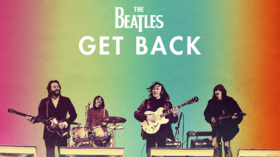Beatles docu-series ‘Get Back’ is great, if you can sit through the 1st episode


Disney Plus and director Peter Jackson fire up the nostalgia machine and let fans have an immersive experience of The Beatles' sometimes tumultuous recording of their final album, ‘Let It Be’.
The recording of Let It Be, The Beatles’ 12th and final studio album, in January of 1969, is often regarded as the moment when the Fab Four finally fell apart and began the process of going their separate ways.
After watching Get Back, the new exhaustive, nearly eight-hour, three-part documentary mini-series from Academy Award-winning director Peter Jackson which chronicles that allegedly tempestuous recording session, I can report that Let It Be didn’t leave The Beatles broken, but you could certainly see the cracks.
The band’s next recording session, for the album Abbey Road (which would be released before Let It Be), took place just months later in 1969 and led to The Beatles, the most important band in rock and roll history, officially breaking up.
Originally, Let It Be was ambitiously conceived as an album, a TV special, and a live concert, all of which were to be captured over a three-week span in January 1969.
Documentarian Michael Lindsay-Hogg was there with cameras rolling as John, Paul, George, and Ringo – a walking, talking rock and roll Mount Rushmore – tried to write an album’s worth of material from scratch and prepare for a live show, all while being under the microscope of cameras.
Lindsay-Hogg shot and recorded 60 hours of film footage and 150 hours of audio, and while the TV show idea was scrapped, Hogg eventually released his own film, running to an hour and 20 minutes in length, titled Let it Be, which came out just after the album of the same name in 1970.
Peter Jackson, of The Lord of the Rings fame, has taken a deep dive into Lindsay-Hogg’s ocean of material and come up with Get Back, which was meant to be two hours long and theatrically released but morphed into the massive eight-hour mini-series now streaming on Disney Plus.
Get Back opens as The Beatles move into a rather lifeless, makeshift recording studio at Twickenham Film Studios, where the band attempts to write songs and rehearse for their album and impending live show, which will be their first in nearly three years.
The documentary at first feels rudderless, as there’s no talking heads or guide to narrate the action – it’s just The Beatles and their entourage hanging out, eating toast, drinking tea, smoking cigarettes, and getting little accomplished as the clock ticks.
This opening episode is relentlessly frustrating, but that’s the point. Peter Jackson turns The Beatles’ malaise into the viewer’s malaise, and while the documentary at first feels meandering, as it moves forward it becomes mesmerizing.
Remarkably, Get Back makes you feel, if not like a silent member of The Beatles (like Ringo!), then at least like a fly on the wall as these icons wade into and out of the morass of the magical mystery tour of music making.
The cast of characters and archetypes of The Beatles drama is well known and they’re all on display in Get Back. There’s the rebellious genius, John. The brilliant, ambitious nice-guy, Paul. The quiet yet gifted and sometimes disgruntled middle-child, George. As well as the under-appreciated lovable lug, Ringo.
There’s also the omnipresent Yoko, looming like a gargoyle succubus whispering into John’s ear and occasionally screeching into microphones.
As you spend nearly eight hours with The Beatles, the one thing about them that becomes crystal clear is how incredibly normal and good-natured they appear to be. They certainly disagree with one another, but even their clashes are mostly respectful and polite, especially when you consider how pampered and wealthy they were, how much pressure they were under, and how sick of each other they must have been by that point.
And while there’s a decent amount of gossipy band drama on display in the documentary, like watching Paul trying to be the boss, George asserting himself, John withdrawing, and Ringo just being an all-around great guy, that ultimately feels entirely secondary to the joy of simply experiencing their unadulterated genius.
Watching The Beatles, the godfathers of basically every pop and rock song over the last fifty years, jam and create music, such as when Paul takes mere moments to conjure out of thin air the song ‘Get Back’, is astonishing and exhilarating.
It’s also pretty fascinating watching the interpersonal dynamics of the band change when the brilliant Billy Preston enters the sessions as a keyboardist, and when the venue changes from the cold and cavernous Twickenham to the comfortable confines of their Apple studio.
There are a few moments in the mini-series that stood out. For instance, the audio recording of John and Paul’s conversation after George exits the band radiates with a palpable emotion built by an intense personal history and is undeniably captivating and compelling.
Other moments too stand out, such as when Paul says to the crew, “It’s silly, fifty years from now they’re going to say that The Beatles broke up because Yoko sat on an amp,” which is ironically insightful. In contrast, after George leaves the band and John is missing from rehearsal, Paul says to Ringo, “And then there were two,” and it feels ominously prescient considering the eventual murder of John Lennon, and George Harrison’s untimely death from cancer.
Ultimately, if you’re a Beatles fanatic or even just a fan of music, then Get Back is most definitely for you, as it’s a powerful nostalgia hit that reminds us what musical genius truly looks like. In our current age where “rock is dead” and musicianship and musicality – never mind musical genius – are sorely lacking, if not utterly devoid from popular music, that has tremendous value.